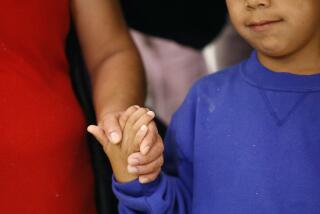GOING HOME ALONE : If the Alternative Is Newt’s House, Then Maybe Orphanages Are a Good Idea After All
- Share via
Imagining yourself orphaned, or a foundling with a mysterious pedigree, is a good-sized part of the vengeful fantasy life of every kid ever sent sulking to his or her room:
I wish you’d get hit in the head by a bowling ball. Or more elaborately: You aren’t my real parents. My real parents are Mrs. Fields and the Terminator. When they come back, they’ll make you sorry.
Say what you will about the Republicans’ retro fondness for orphanages, the GOP has tapped into our adult wishful thinking--childhood wilfullness uncoupled from discipline, the fanciful notions that reappear among certain gentlemen at about age 50.
Look at this orphanage revival as an opportunity, a chance for Hollywood and America to rediscover some great storytelling about plucky bootstrap girls and boys who make their way in a harsh world with a smile. The last time we had truly classic movies and great, tearjerker doorstop novels was about the same time we dismantled the orphanages in this country.
Coincidence? I don’t think so. Orphans have always made for great plots. Children’s books glorify being parent-free, which makes me wonder why the book-banners haven’t caught on:
Tom Sawyer was an orphan. Huck Finn was as good as, with that no-’count Pap of his. Mowgli in “The Jungle Book,” Tarzan of the apes--both orphans.
Pippi Longstocking, the original wacky redhead, her father absent at sea or dead, was footloose and rich, and as lightheartedly heartless as children can be.
Becky Sharp was an orphan, cast on the world and on her substantial wits. Ishmael in “Moby Dick”--the orphan survivor of the Pequod. Little Orphan Annie--obvious. Heidi, orphan. Bambi, orphan.
Anne of Green Gables came straight out of the orphanage. Sara Crewe, Jane Eyre, Oliver Twist--orphans all.
In real life, too, orphans and orphanages make their mark as they make their way:
Edgar Allen Poe, an orphan. Edith Piaf, an orphan. Babe Ruth--where do you think the Bambino learned to hit like that? In an orphanage.
Nancy Kerrigan, with two loving parents--the silver. Oksana Baiul, orphan and gold medalist.
Still, the gold-medal movie orphan is Shirley Temple, who must have gone through more sets of parents than divorce court. Being cast as Shirley’s parents was practically a death warrant.
But she never would have become the star she was if she hadn’t been in an orphanage, with an audience of other orphans happy to be entertained after lights-out as Shirley tapped and warbled her little heart out. If she’d been living at home with a mom and dad telling her to cut out that racket and go to bed, she would have wound up a talentless little nobody.
Judging by books and movies, being orphaned just brings out the best in children. Left to their own devices, they learn ingenuity, self-reliance and spirit--just about everything the Contract With America could want. They transform themselves into little heroes and heroines you just can’t help cheering for. Suffering not only builds character . . . it creates them, too.
Dysfunction, complexes, neuroses, abandonment--Stella Dallas and Anna Karenina, Oedipus and Hamlet. That’s the stuff of literature; that’s what makes great movies and immortal novels.
Why, the screenplays will just start churning out of orphanages, and if Newt Gingrich is the man I think he is, he’ll negotiate orphan net points in the fine print of that Contract of his.
Or maybe Mr. Gingrich wasn’t thinking about literature at all when he spoke of bringing back orphanages as shelter for those who need it. Maybe he was thinking about politics and remembering the saying that victory has a hundred fathers, but defeat is an orphan.
More to Read
Sign up for our Book Club newsletter
Get the latest news, events and more from the Los Angeles Times Book Club, and help us get L.A. reading and talking.
You may occasionally receive promotional content from the Los Angeles Times.








